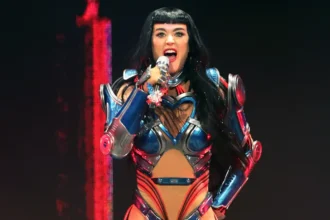Donald Trump’s War on Democracy Comes for TV — ‘The Late Show’ First
Introduction
In the ever-complex landscape of American politics, one of the most troubling dimensions has been the tension between media, entertainment, and democracy. Recently, late-night television, often a vibrant arena for political satire and commentary, found itself at the center of this precarious balance. The late-night landscape, once dominated by the sharp wit of hosts like Stephen Colbert on "The Late Show," has begun to feel the sting of a newfound political reality — a growing war on democracy, advocated by none other than Donald Trump and his loyalists. This post delves deep into the implications of this war as it spills over into the realm of television, specifically examining how late-night programs are being affected.
A Historic Landscape of Late-Night Comedy
Late-night television has long been a space where politics and humor converge. From Johnny Carson to David Letterman, and now to Jimmy Fallon and Stephen Colbert, these shows have crafted a legacy of tackling societal issues, mocking political figures, and offering a platform for candid discussions. Colbert’s "The Late Show," in particular, has earned praise for its incisive commentary on current events, specifically focusing on Donald Trump’s presidency and the contentious issues surrounding it.
In times of political distress, such as the Watergate scandal or more recently, Trump’s impeachment, comedy became a refuge — a means for the public to digest complicated realities through laughter and satire. However, as we’ve seen with the rise of omnipresent social media and the polarization of political discourse, late-night shows are now navigating a treacherous minefield that blurs the lines between comedy and serious political engagement.
The Targeting of Late Night TV
Trump’s disdain for media has consistently put outlets and personalities who criticize him in the line of fire. His complaints about the "fake news" media have escalated to include not just traditional news outlets but also entertainment figures, particularly those who use their platforms to critique his administration. Colbert, who transformed his show into a vocal critique of Trump, became a significant target in this landscape.
Trump’s approach led to a tit-for-tat dynamic. His supporters often took to social media, launching campaigns against hosts like Colbert. The consequence? A ripple effect shifting how humor and critique can be expressed, fostering an atmosphere of fear among some creatives and comedians, ultimately shaking the foundational role of satire in a democratic society.
Censorship and Self-Censorship
The real danger lies not just in explicit attacks but in the underlying fear that stifles creativity and genuine expression. Comedians, writers, and producers might second-guess their content, worrying about potential backlash or negative media attention. This self-censorship percolates through the bones of creative expression, which could lead to a watered-down version of comedy lacking the boldness and candor it historically embodies.
Single jokes or segments featuring political critique suddenly become polarizing, risking audience alienation. So, does comedy, a bastion of freedom of speech, thus spiral into cautious murmurs? While late-night hosts like Colbert have valiantly continued their respective missions, the sense of trepidation about the socio-political climate inevitably seeps into the material being produced.
Stephen Colbert Channels the Beach Boys to Solve Latest Trump Mystery: ‘What Happened to Jeffrey Epstein? God Only Knows’New Dynamics: The Influence of Social Media
The rise of social media has fundamentally altered how late-night shows operate. Platforms like Twitter, Instagram, and TikTok have pushed traditional media into a new cycle of instant response and feedback. On one hand, this allows comedians to directly engage with fans and adapt content in near real-time; on the other, it opens the floodgates for disinformation and polarized opinions to flourish.
Trump’s influence permeates through these platforms and often manifests as memes, viral videos, or shared posts that can easily skew the actual issues at hand. Late-night shows are at risk of becoming mere cogs in this machine, where their parodies become breeding grounds for division instead of tools for unity and understanding.
The Echo Chamber Effect
As content is increasingly consumed via social media, a phenomenon known as the "echo chamber effect" has gained traction. Followers of Trump may exclusively engage with content that aligns with their viewpoints, further entrenching their beliefs and creating division. This reality complicates the landscape for late-night hosts, who must navigate a fine line between appealing to their traditional audiences while not alienating broader viewers who may have differing opinions.
The risk is that the topical nature of late-night shows could reinforce existing biases instead of challenging them. If the goal of comedians is to prompt reflection and encourage critical thinking, it becomes convoluted when a significant portion of their audience tunes in solely to receive affirmation.
The Future of Comedy in a Tumultuous Climate
As this nuanced war on democracy unfolds, the question arises: what is the future of late-night television? Will it retreat into caution, becoming mere entertainment devoid of political engagement? Or will it evolve, finding innovative ways to address societal challenges, fostering dialogue while still pushing boundaries?
Hosts like Colbert may need to double down on their commitment to satire and social commentary. They can also harness the power of collaboration, inviting diverse voices that resonate across the political spectrum. By presenting various perspectives, late-night television can fulfill its purpose as a crucial player in democratic discourse and not merely as a partisan space.
Conclusion
Donald Trump’s war on democracy and his targeting of figures like Stephen Colbert on "The Late Show" serve as a stark reminder of the shifting dynamics between politics, media, and public engagement. As late-night television faces pressure from both sides of the political spectrum, the need for authenticity, creativity, and boldness becomes crucial in navigating this complicated landscape. The continuing evolution of these shows will be an essential barometer for democracy itself, testing the resilience of not only late-night comedy but the broader fabric of American discourse. In the end, the commitment to scrutinize power structures through humor remains a vital lifeline for democracy— a reminder that humor still holds the power to unite.
Jerry O’Connell & Rebecca Romijn Explain Why They Have Separate Bank Accounts | Jerry O’Connell, Rebecca Romijn | Just Jared: Celebrity News and Gossip


